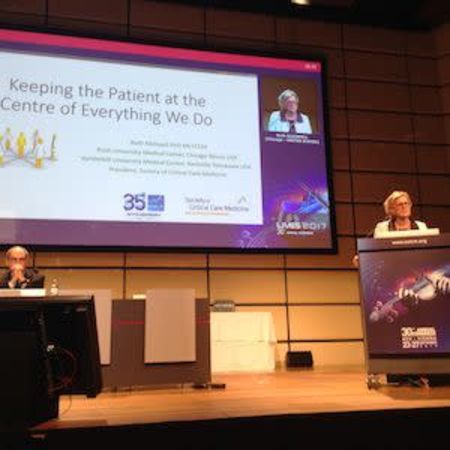“Keeping the patient at the centre of everything we do” was the key message from the U.S. Society of Critical Care Medicine President, Ruth Kleinpell, PhD, RN, FCCM, who reinforced the increased focus on patient- and family-centred care in a presentation to the European Society of Intensive Care Medicine’s 3oth annual congress, which met in Vienna last week.
As the focus has increased on quality of life after ICU, and more research on the impact of the ICU on survivors is published, so there is a growing emphasis on involving patients and families in care, said Kleinpell. Knowing that both patients and families can suffer post-traumatic stress disorder (PTSD), making the ICU experience less stressful is a priority, and education, communication and information are vital, she said.
The SCCM published guidelines for family-centred care in 2017. In terms of evidence, the recently published meta-analysis of outcomes of patient- and family-centred care interventions in the ICU by Goldfarb et al. in Critical Care Medicine< https://www.ncbi.nlm.nih.gov/pubmed/28749855> found that three-quarters of studies reported one or more positive outcome measures. The random-effects meta-analysis of the highest quality randomised studies showed no significant differences in mortality. However, there was a mean decrease in ICU length of stay by 1.21 days. Improvements in ICU costs, family satisfaction, patient experience, medical goal achievement, and patient and family mental health outcomes were also observed with interventions. Reported outcomes were heterogeneous, which precluded formal meta-analysis.
Implementing family-centred care in the ICU as a project requires ongoing communication on the project status, emphasised Kleinpell. It’s essential to get buy in as well as hold routine scheduled meetings that involve senior leaders to keep enthusiasm and momentum going.
The SCCM’s Patient-Centered Outcomes Research (PCOR)-ICU Collaborative includes 63 ICU teams who are implementing patient- and family-centred engagement initiatives over a 10 month period.
Kleinpell described the experiences at her own ICU, where they began to include families in rounds in January. They have a structured script to invite families, who are informed that rounds start every day at a certain time. The multidisciplinary team circles back after rounds to answer family’s questions. It’s beneficial to engage families, said Kleinpell. In their experience, families are “interested and amazed at the degree of intricacy of interactions about their loved ones’ cares”. Including families in rounds builds trust, helps with communication, and hopefully leads to fewer conflicts in care.



























